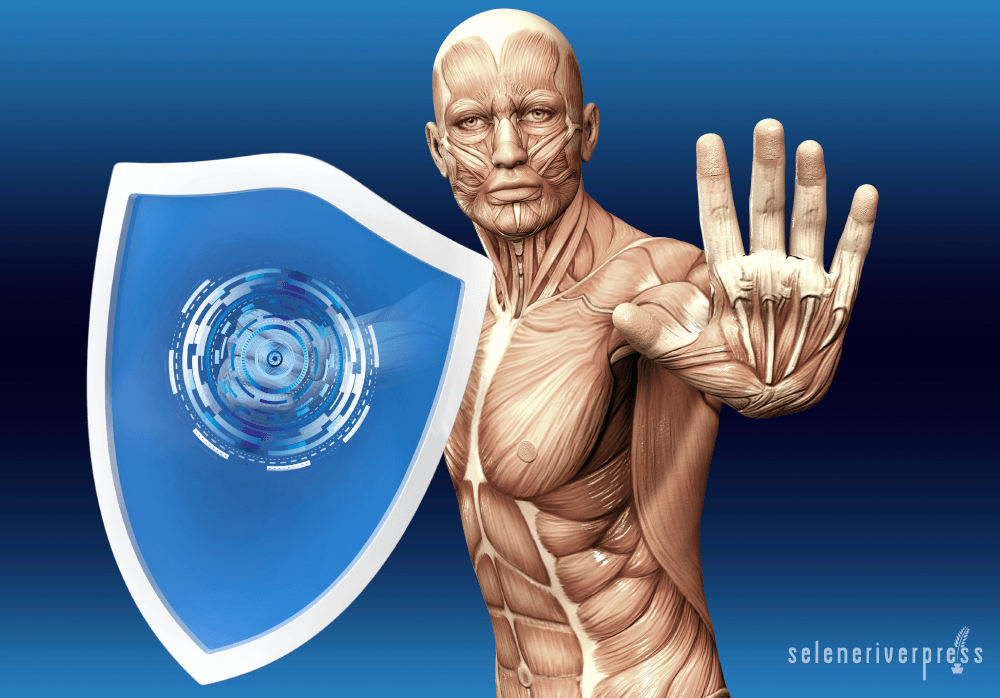We see the words “healing the immune system” in hundreds of magazines, TV shows, and pieces of literature. I recently found out from a family member that there are even immune system research centers where children can be tested and treated for immune system disorders! I can only surmise they treat such disorders with steroids and more antibiotics, both of which have devastating effects!
OK, let’s all agree that a weakened immune system is to blame for repeated, year-after-year colds, as well as the flu, strep, and numerous other conditions we cannot prevent despite the gargantuan efforts we make to eat healthy, exercise, and think positive thoughts. Something has to be very wrong, but what?
Let’s explore our amazing immune system a bit. Let’s see if, by understanding it better, we can make the changes that will help us build up a strong, healthy immune system for the rest of our lives. Yes, it is really possible!
In a recent conversation with one of my favorite Standard Process mentors, Joseph Antell, I came away stunned at how little most of us know about the immune system—how it works, where it’s located, and what we can do to both heal it and keep it healthy throughout our lifetime. Following is a brief explanation of our conversation. I hope it will get my readers on the path to a healthy immune system.
What and Where Is the Immune System?
The immune system is a group of interwoven cells, organs, and glands that comprise an intricate part of the body. It is not, as many think, an individual organ. Following are the main portions of the body that make up the immune system.
Digestive System
This is the first line of defense in protecting our overall well-being. A full 70–90 percent of the immune system is dependent on the health of our digestive system. There are numerous references to this fact in medical and holistic literature. It’s often called our “second brain” or the “center of digestive intelligence.” One of the main functions of the digestive system is to produce HCL (hydrochloric acid), which in turn breaks down the food we ingest and kills pathogens and toxins in our food. HCL is also a deterrent to parasites. It’s important to note that HCL wanes after the age of 40. Medications such as acid blockers for acid reflux interfere with HCL production and other digestive functions.
Joseph tells me that there are more than one billion friendly bacterial cells per square inch of our digestive tract. The simple fact is that without proper levels of HCL and other pre- and probiotic substances (as found in fermented food and beverages), our digestive system will weaken—and therefore so will our immune system!
General symptoms: You can identify a compromised digestive tract with one of the following problems: bloating, flatulence/gas, foul orders, diverticulitis, IBS, and gluten intolerance (even if you haven’t been diagnosed with Celiac disease). The list goes on. Read more on healing the gut below.
The Four Pillars of the Immune System
1. Thymus gland
2. Spleen
3. Liver
4. Bone marrow
#1. Thymus Gland
The main organ of the lymphatic system, located in the upper chest region. The primary function of the thymus gland is to promote the development of specific cells of the immune system called T lymphocytes. T lymphocytes (or T cells) are white blood cells that protect against foreign organisms (bacteria and viruses) that manage to infect the body’s cells. Find more information on the thymus gland here.
General symptoms: Frequent and repeated colds, sore throats, flu symptoms, and inability to stay consistently well. Read more on maintaining thymus gland health below.
#2. Spleen
The largest organ of the lymphatic system, located in the upper left region of the abdominal cavity. The spleen’s primary function is to filter blood by breaking down damaged cells, cellular debris, and pathogens such as bacteria and viruses. The spleen houses and aids the maturation of immune system cells called lymphocytes, white blood cells that protect against foreign organisms. The spleen is critical to the immune response against antigens (a harmful substance that causes the body to produce antibodies) in the blood. Find more information on the spleen here.
General symptoms: Chronic infections, poor mineral absorption as in osteoporosis or osteopenia (low bone mass), skin issues, sluggish digestion, gallstones, constipation, and heartburn. Read more on maintaining spleen health below.
#3. Liver
This organ plays a critical role in the immune system by synthesizing molecules utilized elsewhere to support homeostasis; converting molecules of one type to another; and regulating energy balances. The major metabolic functions of the liver can be summarized into three main categories:
- Carbohydrate metabolism: The liver is critical to maintaining concentrations of glucose in blood within a narrow, normal range. Maintenance of normal blood glucose levels over both the short-term (hours) and long-term (days to weeks) is one particularly important function of the liver.
- Fat metabolism: The liver is extremely active in oxidizing triglycerides to produce energy. It breaks down many more fatty acids than the liver cells need and exports large quantities of acetoacetate (a ketone involved in fat metabolism) into blood, where it can be picked up and readily metabolized by other tissues.
- Protein metabolism of amino acids, followed by conversion of the non-nitrogenous part of those molecules to glucose or lipids. Several of the enzymes used in these pathways (for example, alanine and aspartate aminotransferases) are commonly assayed in serum to assess liver damage. Find more information on the metabolic function of the liver here.
General symptoms: Dark circles around the eyes, body odors (feet, underarms, breath), and foul smelling fecal matter or urine. Read more on maintaining liver health below.
#4. Bone Marrow
This is the soft, flexible connective tissue within bone cavities. A component of the lymphatic system, bone marrow functions primarily to produce blood cells and store fat. Bone marrow is highly vascular, meaning that it’s richly supplied with a large number of blood vessels. On average, bone marrow can generate hundreds of billions of new blood cells every day. Find more detailed information on bone marrow here.
General symptoms: Chronic infections that don’t easily resolve on their own and may be indicative of a more serious systemic health issue. Read more on maintaining bone marrow health below.
Main Steps to Healing Your Immune System
1. Stop the antibiotics. According to Gut and Psychology Syndrome by Dr. Natasha Campbell-McBride:
- Antibiotics have a devastating effect on beneficial bacteria in the human body, not only in the gut but in other organs and tissues.
- Antibiotics change benign bacteria, viruses and fungi to pathogenic organisms, giving them an ability to invade tissues and cause disease.
- Antibiotics make bacteria resistant to antibiotics, so the industry has to work on more and more powerful new antibiotics to attack these new changed bacteria. [A good example is tuberculosis, where wide use of antibiotics has created new varieties of Mycobacterium tuberculosis, which is resistant to all existing antibiotics.]
- Antibiotics have a direct damaging effect on the immune system, making us more vulnerable to infections, which leads to a vicious cycle of more antibiotics and more infections.
2. Eat nutrient dense food. Although many people choose to endure the devastating effects of a compromised immune system year after year, without a gradual move to nutrient dense foods, your success will be limited and disappointing.
Fermented foods:
- Prevent decay, not only in food but in the bowels.
- Stimulate the peristaltic movement of the intestines.
- Assist in the circulation of the blood.
- Have a harmonizing effect on the stomach; strengthen the acidity of gastric juice when production lags; and reduce acidity when production is up.
- Relieve the burden on the digestive system by significantly improving intestinal digestion.
- Increase nutrient absorption.
Learn how to make your own fermented foods with my DVD Cook Your Way to Wellness.
List of the most nutrient dense foods recommended by Sally Fallon Morrell:
- Butter from grass-fed cows (preferably raw)
- Oysters
- Liver from grass-fed animals
- Eggs from grass-fed hens
- Cod liver oil (I suggest Green Pasture)
- Fish eggs
- Whole raw milk from grass-fed cows
- Bone broth
- Shrimp
- Wild salmon
- Whole yogurt or kefir
- Beef from grass-fed steers
- Fermented sauerkraut
- Organic beets
3. Supplement your diet with intelligently engineered whole food supplements. See below for a list of Standard Process supplements recommended by Joseph Antell.
Zypan: The perfect answer after each meal to insure you’re getting sufficient hydrochloric acid.
Calcium Lactate: Engages phagocytosis, the process by which a cell engulfs material either to destroy it, to feed on it, or to get information from it. Learn how important this process is to your own immune system.
Immuplex: An all-in-one whole food supplement that nourishes all four pillars of the immune system. Contains thymus, spleen, liver, and bone marrow.
Cataplex C: Destroys pathogens (bacterial and viral).
Lactic Acid Yeast: Balances the pH of the intestinal environment and converts carbohydrates into lactic acid.
As I grow older and, hopefully, wiser, my observation is that too many of us, although well-intentioned, have nevertheless lost our connection to the earth and nature by not engaging in gardening or cooking at home. We no longer make the time to study herbs, natural remedies, and the many other secrets that a life slowed down has to offer. This connection, in my opinion, is a main ingredient to maintaining health and wellness, regardless of life’s ups and downs.
Too often, miscellaneous other projects come before that of learning the how-to of vibrant health and peace of mind and spirit. This makes me very sad, and I can only hope that if you have gotten this far, these few words regarding the immune system will encourage you to make quality time to do those things that will indeed keep you and your family healthy for the long-term.
AUTHOR’S NOTE
To choose your organically grown and fresh ingredients wisely, use the following criteria:
- chemical- and hormone-free meat
- wild-caught fish
- pasture-raised, organic eggs
- whole, unrefined grains
- virgin, unrefined, first-press organic oils
- whole-food, unrefined sweeteners
- pure, clean, spring water
- sea salt
- raw and/or cultured milk and cream products
Photo from iStock/Svisio
Note from Maria: I am a Certified Natural Health Professional, CNHP, not a medical doctor. I do not diagnose, prescribe for, treat, or claim to prevent, mitigate, or cure any human diseases. Please see your medical doctor prior to following any recommendations I make in my blogs or on my website.




Great info, thank you for the break down on how our immune system really functions. What a journey we are on, but we’ll worth the knowledge base you are sharing. Thank you.
Posted on behalf of blogger Maria Atwood:
Hello Mary:
Thank you for your response and vote of confidence. It always helps to
know that what is presented in our individual blogs does in fact help
others. This was one of those subjects that had rattled in the back of
my mind for a long time and so I finally decided
that if I did not thoroughly understand it others too might be in a
quandary. I hope you’re also a gardener and believe in cooking at home.
Be Blessed,
Maria Atwood, CNHP